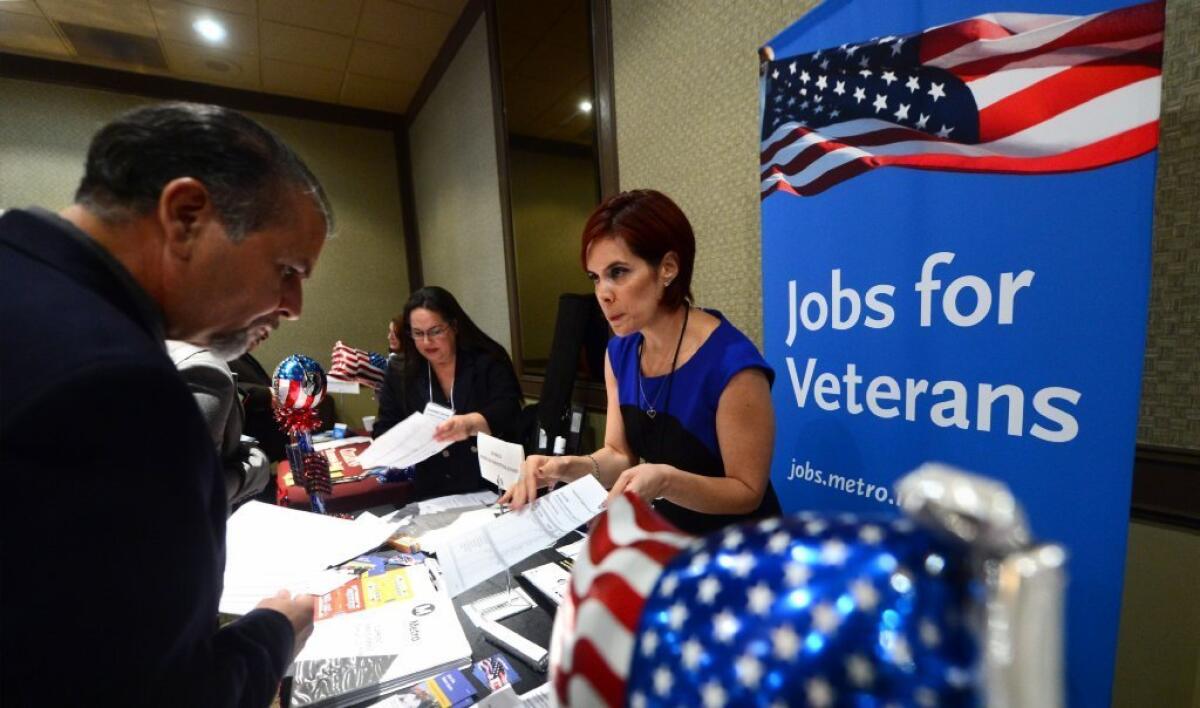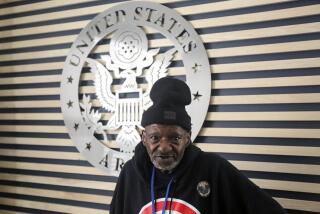Put veterans to work

- Share via
The country’s newest generation of veterans — the 2 million Americans who served honorably in Iraq and Afghanistan — is eager for meaningful civilian work. But misconceptions about veterans often prevent them from getting a fair shake to put their skills to work, achieve their potential and contribute fully to the nation’s economy.
On this Veterans Day, we ask all Americans to make sure veterans get the consideration they deserve.
According to September Bureau of Labor data analyzed by Syracuse University’s Institute for Veterans and Military Families, post-9/11 veterans ages 20 to 24 are 81% more likely to be unemployed than their non-veteran peers, and those ages 25 to 29 are 71% more likely to be out of a job.
This situation is especially frustrating because veterans make great employees. Veterans bring a long list of virtues to the workplace, including leadership ability, a strong sense of teamwork, loyalty and initiative. These qualities are borne out in their performance. Data recently released by the advisory company CEB show that veterans are more likely to stay at a company, and that they deliver 4% greater productivity than their non-veteran peers.
So why do we still face such a grim veteran employment picture? One chief reason is a stubborn and misleading narrative that persists in the minds of many Americans: Every veteran is either a hero or damaged.
This distorted view of veterans gives rise to very real employment obstacles. Research by the Center for a New American Security found that three of the top five reasons veterans are rejected from jobs are rooted in ignorance about military service among managers who should know better.
These reasons include negative stereotypes about veterans (“Will they act out violently in the workplace?”), fear of future deployments (“Will they be yanked out of the workplace without notice?”), and concerns over acclimation (“Will they adjust to civilian culture?”).
The facts about how veterans perform in the civilian workplace negate every one of these preconceptions. So why do they persist? One reason is the distance between ordinary Americans and those who serve. An estimated 93% of the U.S. population has never served in the military, and few of those people have much contact with veterans.
It will take leadership by businesses and communities to upend these misconceptions. For our part, the Call of Duty Endowment has been identifying and funding nongovernmental organizations that prepare vets for the job market. But the challenge involves both supply and demand. Simply preparing veterans for the job market is insufficient; employers must provide opportunities for veterans to put their skills to work.
In the last few years, some members of the business community have stepped up. Successful large-scale efforts from the private sector like the JPMorgan Chase-led 100,000 Jobs Mission, the utility industry’s Troops to Energy program and the U.S. Chamber of Commerce’s Hiring Our Heroes program show that there is high-level support for employing veterans.
But we need all employers — large and small — to set aside misconceptions and consider the tremendous skills and individual qualities that veterans can bring to a job. Don’t just thank veterans for their service.
If you are in a position to interview or review a veteran job candidate, carefully consider the individual before you.
And make sure that your business is tapping into this tremendous personnel resource. Post job openings on military recruiting websites. Participate in veteran hiring fairs. Even if you are not in a hiring position, if you see a hiring manager reject a seemingly well-qualified veteran, ask for an explanation.
It’s in America’s interest to employ veterans. Doing so will make communities stronger and the economy more competitive. It will also demonstrate to those considering enlisting that military service can be a good career step.
Wouldn’t it be wonderful if, next Veterans Day, we can celebrate not just the service veterans have given but also their growing contribution to the economy.
Gen. Jim Jones served as national security advisor to President Obama, commander of the U.S. European Command and 32nd commandant of the Marine Corps. Dan Goldenberg, a Navy veteran and businessman, is executive director of the Call of Duty Endowment.
More to Read
A cure for the common opinion
Get thought-provoking perspectives with our weekly newsletter.
You may occasionally receive promotional content from the Los Angeles Times.










